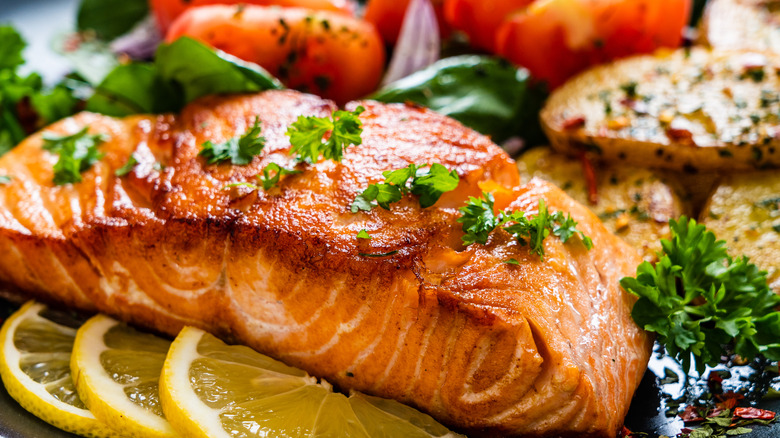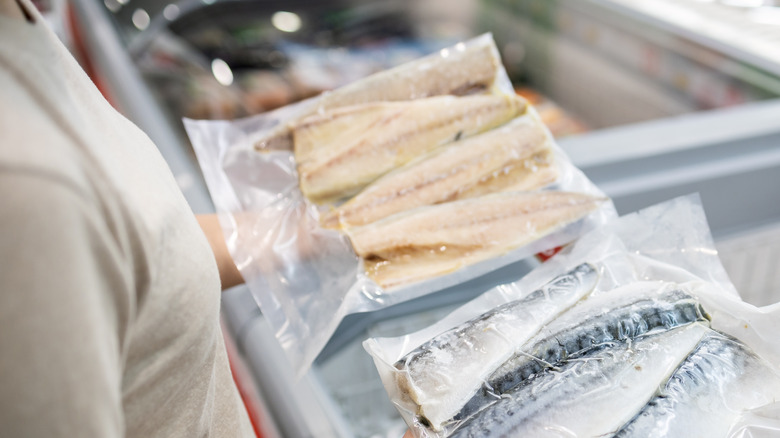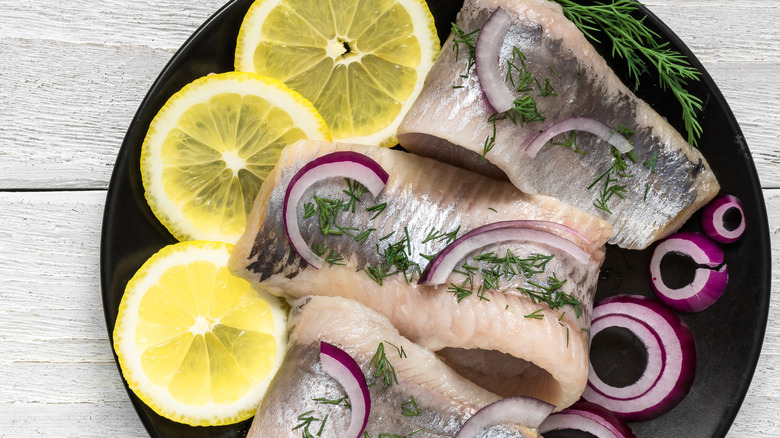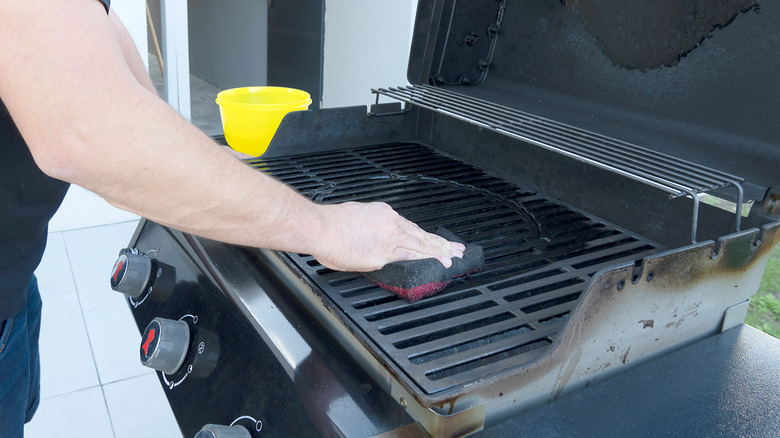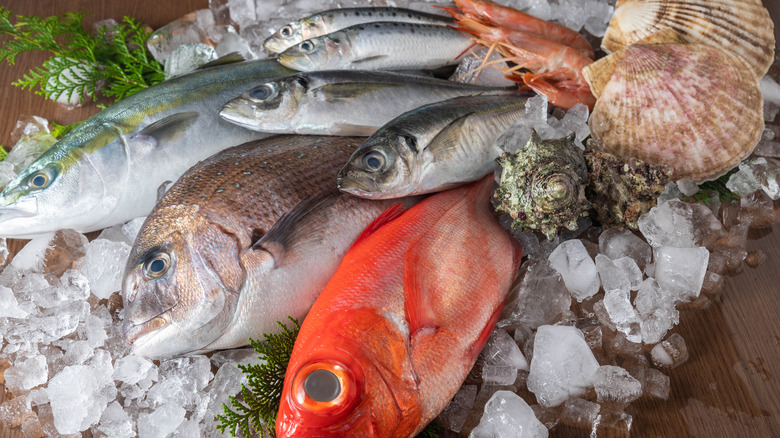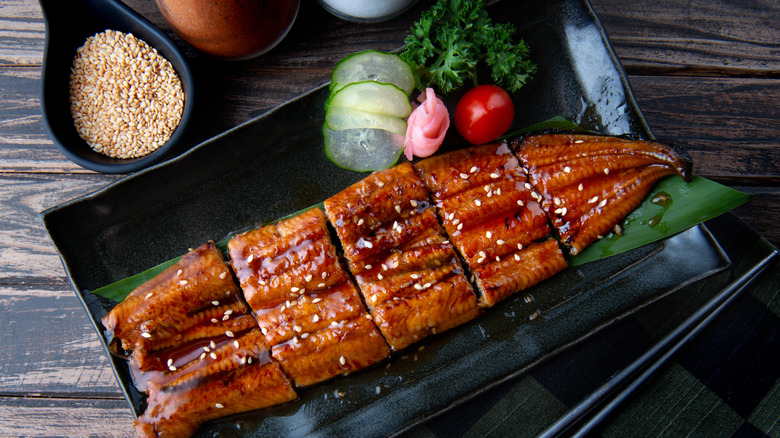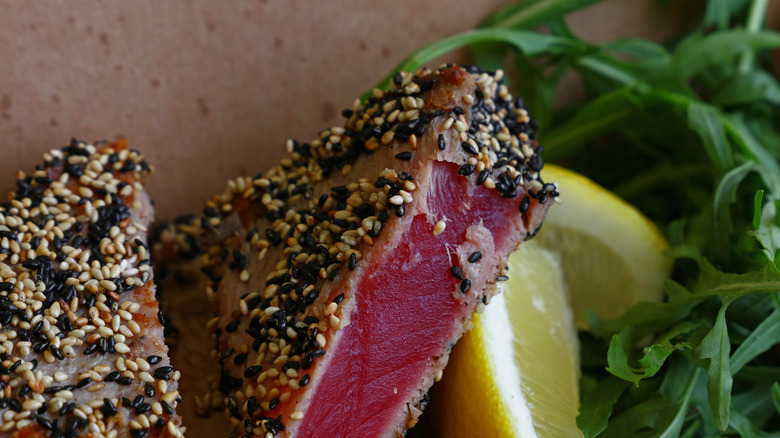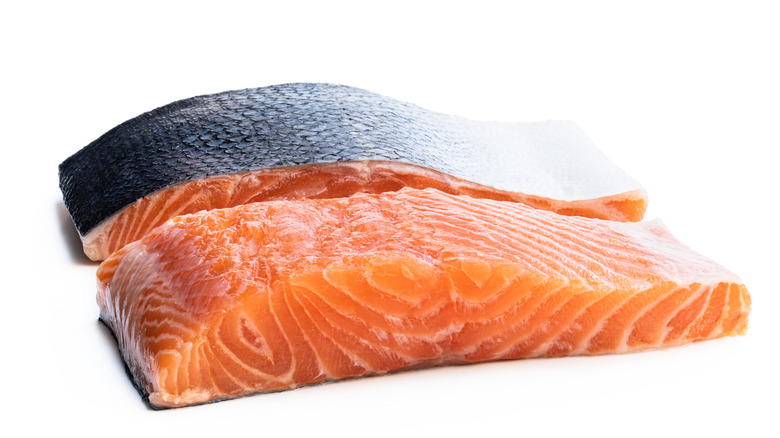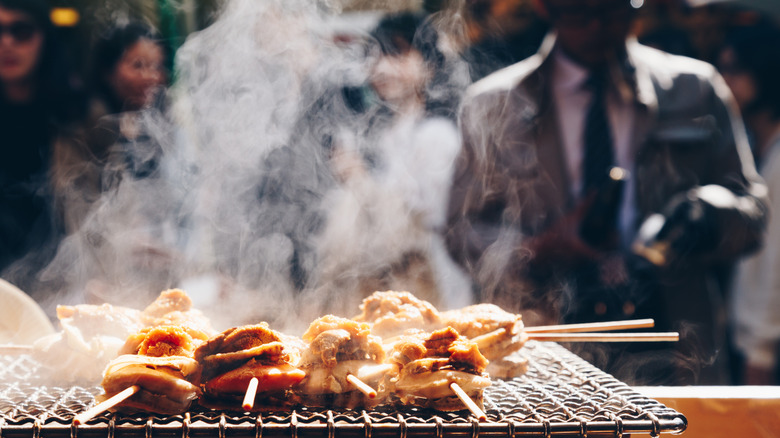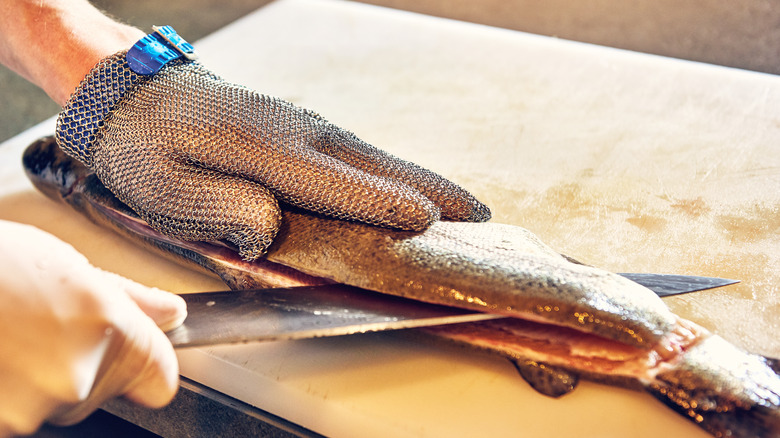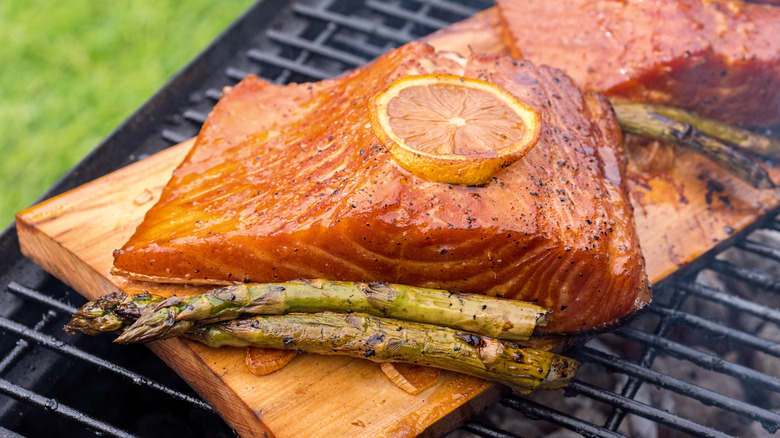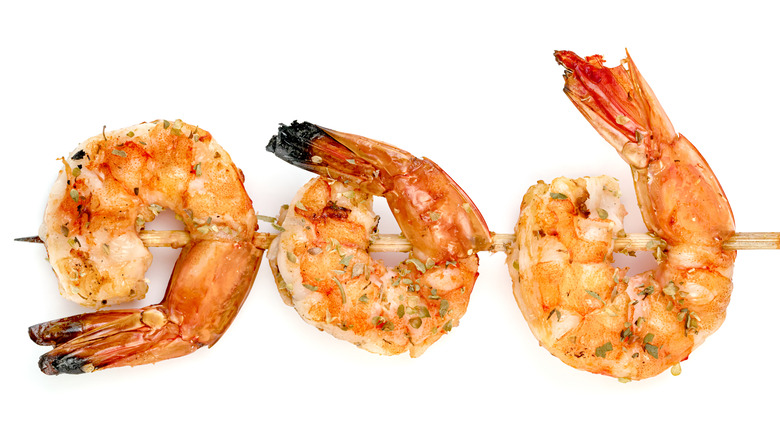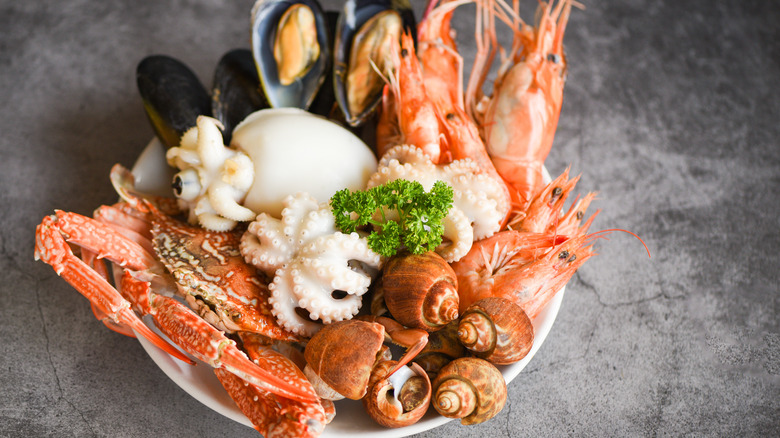Mistakes Everyone Makes When Grilling Seafood
There's no denying a grilled lobster or some skewers of shrimp are one of the great luxuries of summer. Fish on the grill is a lighter, healthier alternative than heavier meat options. But seafood is generally more delicate than other ingredients going on the grill, and that means some keeping some special considerations in mind if you want to get it right. There are a lot of mistakes that can be made along the way when preparing fish, and you should be on the lookout for how to avoid them.
Fish can be light, airy, and delicious when well-prepared but rubbery and unappetizing when it's not. Don't waste your time or money on fish that is overcooked or under seasoned — avoid common grilling mistakes and end up with a really beautiful plate of seafood. Avoid these mistakes, and you'll be enjoying a variety of grilled seafood dishes all summer long (and beyond).
Not buying the best seafood
There's nothing like fresh-caught fish right from the ocean. And while that's not really an option in day-to-day prepping for dinner, you also don't want to be eating fish that has been sitting around for too long.
It's really just about getting the freshest ingredients. In an ideal world, that branzino should still be moving! "I was born and raised in Ancona, Italy, a beautiful city by the Adriatic sea," Chef Andrea Belfiore, founder of Italia Like Locals, told Mashed. "We are obsessed with eating only 'pesce appena pescato:' fish that was just caught," said Belfiore.
Whenever you want to grill a swordfish steak or some scallops, make sure they smell like the ocean when you buy them. Fish tastes the best when it's fresh, but it's also at its healthiest when fresh, so always be sure to ask the fish counter at your grocery store what is fresh that day — and let that guide your dinner menu plans!
Too much seasoning and marinating
Eating and enjoying a great piece of fish is about keeping things simple. "When I think of grilling, I think of primitive cooking. You can't cover the flavor of that tasty, fresh, and expensive fish you just bought," Chef Andrea Belfiore, founder of Italia Like Locals, told Mashed.
Keep the vibe Mediterranean by grilling without seasoning. "Once cooked, lightly salt the fish and then cover it with a super tasty condiment made with chopped capers, green olives, parsley, garlic, lemon zest, lemon juice, and extra virgin olive oil," said Belfiore. You'll thank us for this one! This works great for swordfish, tuna, red snapper, calamari, octopus, salmon, sea bass, and more.
Avoid over-seasoning your seafood. Seafood is really delicate when it comes to flavor. Too much seasoning, spice, or sauce can be overpowering. "When grilling seafood, please try not to over-do it. Olive oil, fresh lemon, butter, and a dash of herbs or black pepper can work just fine," Chef Erica Barrett of SOCU Southern Kitchen and Oyster Bar of Mobile, Alabama, told Mashed.
Not cleaning your grill
Cooking on dirty grates is a very common mistake. "It's important to make sure that your grates are as clean as possible before placing the seafood on the grill," Maille mustard sommelier, Chef Brandon Collins, told Mashed. This will help prevent your food sticking, and will, according to Collins, "help prevent carbonized items (the black specks from burnt leftover food you'll see on dirty grates) from sticking on your food."
To clean, Collins has his own method of choice: "I usually bring my grill up to temp and then scrape the grates down as well as I can, and then finally rub with a towel," said Collins.
If you are keeping your grill below the smoking point of your oil, then Collins says to apply oil to the grates as well with a towel. "If I am going to keep the grates above the smoking point, then I do not apply oil as it will just carbonize and burn off," said Collins.
Not properly thawing your fish
It may seem easier to just grab the fish or shellfish from the freezer and throw it on the grill. That's not the best idea, though.
Proper thawing is critical to preparing high-quality seafood, no matter how you cook it. "When seafood is frozen, the water inside it is bound up in ice crystals," Ben Conniff, co-founder of Luke's Lobster, told Mashed. "If you thaw the seafood slowly in the refrigerator, it not only keeps it safe to eat, it also lets the seafood slowly reabsorb the moisture as those ice crystals melt so its flavor and texture resembles a fresh product," said Conniff.
Timing matters, every step of the way. "The faster seafood thaws, the more that moisture will rush out of the tissue, leaving your seafood dried out and flavorless," said Conniff.
Connif says best practice is to plan to move your seafood from the freezer to the fridge at least 24 hours ahead of starting up your grill. "As you get ready to light your coals, take the fully thawed seafood out and let it rest for 15 to 30 minutes on the counter to get it closer to room temp so you reduce the shock when it hits the flame," said Conniff.
And the importance of proper freezing matters from the get-go. "The speed and method that you use to freeze seafood similarly has a huge effect on the quality once it's thawed, but that's another story!" said Conniff.
Overcooking your fish
Your fish should be charred and crispy on the outside while the inside stays nice and tender. "If you are familiar with cooking a steak, medium or medium-rare is what you want," Chef Andrea Belfiore, founder of Italia Like Locals, told Mashed.
By overcooking the fish, you'll lose its tenderness and flavor, and your guests will essentially be eating a shoe sole. Terrible! "Use a high temperature for a short time. Sometimes, you'll only need to cook the fish on one side, depending on how thick the cut is. You shouldn't flip the fish more than once, just like a steak," said Belfiore.
One of the biggest mistakes people make when grilling seafood is overcooking it. "I've lost count of the thousands of overcooked, rubbery shrimp I've been served," Laura Pauli, a chef and sommelier at San Francisco-based Cucina Testa Rossa, told Mashed. "Seafood has a very high water content, so it will continue cooking once you take it off the heat," said Pauli. The key is to take the fish off just before it's done, and after a few minutes, it will be perfectly cooked.
Undercooking your fish
Many people love a delicious platter of fresh-made sushi. Sushi is, quite often, raw. But not all fish is sushi-grade fish, and if you aren't eating sushi, you want to make sure that the fish is properly cooked.
But what do you do if you are not sure if your fish is cooked thoroughly? "The safest way to make sure it's cooked through is to use a food thermometer to ensure it reaches an internal temperature (at the thickest part) of 145 degrees Fahrenheit," Rima Kleiner, MS, RD at Dish on Fish, told Mashed.
Another way of checking on the doneness of the fish is to cut into the fish and take a look at the inside. "Cooked fish should be opaque (not translucent like when it's raw) and flake easily with a fork," said Kleiner. If it's undercooked, put it back on the grill until it's thoroughly cooked. Better safe than sorry!
Removing the skin of your seafood
It may seem like the skin of a piece of fish is unnecessary excess when preparing to cook and eat that fish. But it's not excess. Do not remove the skin — the skin is delicious, and you are going to want to enjoy every last bite of it!
"Pat dry your fish, place it uncovered skin-side up in the fridge at least 30 min before cooking it," Chef Andrea Belfiore, founder of Italia Like Locals, told Mashed. Patting the fish will allow the skin to get dry, which will ultimately help the skin to crisp up. "Make a couple of cuts through the skin before cooking," said Belfiore. "Season the skin with some salt and pepper, and then place the fish on the grill skin-side down first," said Belfiore.
Be sure to make that skin crispy, like bacon, and get ready — it's going to be super tasty! "Plate the fish showing that beautiful skin," said Belfiore.
Getting fish stuck to the grill
"The biggest problem people make is that they move the fish around too much. The less you touch the fish, the better it is when you are grilling it," said Chef Joey Maggiore of Phoenix. Joey owns and operates The Maggiore Group, which consists of Hash Kitchen, Tomaso's Italian Restaurant, Sicilian Butcher, Sicilian Baker, and a soon-to-open Mexican concept.
Cooks are often tempted to check their fish or flip it, and this can cause it to stick to the grill or fall apart. "Let it finish cooking before touching it," said Maggiore. You can also lightly rub olive oil on the grill before you put the fish down when you're sautéing it to help prevent the sticking, said Maggiore. Similar to crafting the perfect burger, stick to one flip on each side.
You also need to know you have chosen the right fish to throw on the grill. If the fish you're buying is super flaky or a delicate fish, it should not be put on the grill. "Stick to fishes like salmon and swordfish that can withstand the heat of the grill and heat through to perfection," said Maggiore.
If your fish falls apart, you may need to make lemons out of lemonade. "The best course of action [if your fish falls apart] is to throw it on a salad or hope it's taco Tuesday and break it up for some fish tacos with cabbage and pickled cucumbers," said Maggiore.
Not checking for bones
No one wants to end up accidentally swallowing a bone while eating a piece of fish. This is more than unappetizing — it can also be dangerous and lead to choking.
But mistakes happen, and some bones do sometimes end up in your fish when it gets on your plate. Forgot to debone your fish before marinating? No worries! You can still save that fish. "Keep a pair of needle-nosed pliers in your kitchen — reserved for raw food only — and use them to remove visible bones," Rima Kleiner, MS, RD at Dish on Fish, told Mashed.
"If you forgot to debone before cooking, just pull slightly. They should come out easily," said Kleiner. Now that fish will be bone free and safe to eat. And don't forget to wash those pliers well between uses so they don't smell like fish! That way, they'll always be ready when you need them.
Not using a wood plank
One of the biggest mistakes people make when grilling seafood is not giving a wood plank a try. It's a small action that can make a world of difference in the taste and flavor of the final result.
"Putting your fish on a wood plank (usually cedar) keeps the bottom part of the fish away from direct heat," Shawn Hill, a grill master with The Grilling Dad, told Mashed. "Not doing so can lead to a burnt bottom and an uncooked top part of the fish."
Use a wood plank to get evenly grilled fish and enjoy the nice flavor infusion it also brings. Grilling that fish directly on the plank adds smoky and earthy flavors from the timber, according to culinary scientist Jessica Gavin. That means all those flavors of the wood go into your fish and give it a whole other layer of flavor to enjoy.
Not using a skewer
Another great asset to use when you're grilling seafood is a skewer.
When grilling shrimp, a common mistake cooks make is not trying to enjoy that shrimp by cooking it on a skewer. "If you try to grill them without a skewer, they can fall through the grates of the grill when you turn them," Chef Erik Pettersen, executive chef and owner of Evo Italian in Tequesta, Florida, told Mashed.
Safeness matters here in a big way, though, so don't skip the step of soaking the skewers before using. It's important! "Make sure your wood skewers are soaked in water for at least 30 minutes before using them. This is to make sure they are super wet and so they won't catch on fire while you are cooking," said Pettersen. They are wood on an open flame, after all, and you don't want your dinner to catch fire.
Having too much on the table
You can never have too much of a good thing, right?
Well, not necessarily. With fish, it's really best to try to keep it simple. "Don't grill more than three kinds of seafood," Chef Andrea Belfiore, founder of Italia Like Locals, told Mashed.
When serving the fish, always serve the most delicate fish first. For example: "I would start with some scallops and then a black sea bass," said Belfiore.
And make a point of not serving too many fatty cuts in one meal. "Salmon, swordfish, and sea bass are all really fatty, so don't serve all of them in one night. It can get a bit intense for your guests," said Belfiore. The experience of eating fish should be light and delicious — not overwhelming. Leave them satisfied at the end of the night, and if you follow all these tips, they will be!
